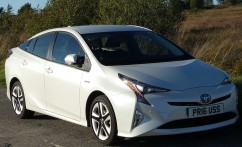 |
 08-26-2016, 02:35 PM
08-26-2016, 02:35 PM
|
#1
|
|
Registered Member

Join Date: Apr 2011
Location: IL/AR
Posts: 76
Country: United States
|
U.S. regulators proposal would restrict big trucks and buses to speeds below 70 mph
This would obviously save a lot fuel on the highways, no doubt.
I know the rest of the First World countries already limit their trucks like this, either by law (such as 90 km/h in the EU?) or incentives, like speed cameras.
My concern is that limiting semi trucks below 70 mph would increase speed differentials with passenger cars, especially in Western states with 75-80 mph speed limits, thereby increasing the risk of a crash. However, the safest way to implement this (besides speed cameras) is to much more aggressively enforce "Keep Right Except to Pass" and make it illegal to pass on the right on rural Interstates to reduce such risks, much like what is practiced in the UK (though reversed) and Germany.
Thoughts?
Obama Administration Wants Speed Limiters on Big Trucks and Buses - The Drive
Quote:
Obama Administration Wants Speed Limiters on Big Trucks and Buses
New proposal would restrict heavy-duty vehicles to speeds below 70 miles per hour.
BY WILL SABEL COURTNEYAUGUST 26, 2016
Better check those air brakes. On Friday, the Obama administration proposed a measure to limit the top speeds of large trucks and buses.
The new rule, suggested by the National Highway Traffic Safety Administration and the Federal Motor Carrier Safety Administration, proposes limiting road-going vehicles weighing more than 26,000 pounds to a top speed of either 60, 65, or 68 miles per hour. The agencies say they will consider alternatives to these speeds, however, based on public comment.
The size category in question covers semi-trucks, garbage trucks, and dump trucks, among many other types of rig, as well as a large chunk of the nation’s bus fleet. Under the proposal, only new trucks and buses would be equipped with the speed limiters, with the vehicle operators being responsible for setting the devices at or below the maximum speed.
The U.S. Department of Transportation suggests the move could save more than $1 billion in fuel costs every year, on top of the safety benefits to cutting down on the kinetic energy of these road-going goliaths.
“This is basic physics,” NHTSA administrator Mark Rosekind said in a statement. “Even small increases in speed have large effects on the force of impact. Setting the speed limit on heavy vehicles makes sense for safety and the environment.”
The idea of limiting the speeds of trucks and other large vehicles is not new. The European Union, Australia, Japan, and the Canadian provinces of Ontario and Quebec have imposed legal restrictions on how fast trucks can travel. However, the U.S. trucking industry has resisted past efforts to cap the velocities of its vehicles, according to The Verge.
According to a report issued by the NHTSA, limiting the speeds of large vehicles could save between 27 and 498 lives every year on America’s roadways, with the number rising as the maximum speed falls. The agency suggests approximately 1,044 fatalities occurred in crashes where the speed of a large vehicle was a factor in the accident between 2004 and 2014.
At least one group representing truckers has spoken out in favor of the measure. Sean McNally, spokesperson for the American Trucking Associations, told Trucks.com that speed is a factor in almost a quarter of all truck crashes and a third of all motor vehicle accidents overall. McNally’s group has previously urged regulators to limit all vehicles—including passenger cars—to 65 miles per hour, thus likely earning the ATA the ire of every person reading this sentence.
|
|

|

|
 08-26-2016, 03:09 PM
08-26-2016, 03:09 PM
|
#2
|
|
Registered Member

Join Date: May 2014
Posts: 464
Country: United Kingdom
Location: East Yorkshire
|
I'm pretty sure most of our big trucks are limited to 56 mph on the motorway and 40 mph on the rest of the road network.
I used to travel long distance at 56 mph to pick up my best tanks (on previous cars), 80 - 86 mpg (imp.). Very few trucks inched past me at just over 56 mph.
When i worked at a petrol station, the tanker diver estimated he got 9-11 mpg.
If trucks in the US are regularly driving at 70 mph, what sort of mileage are they getting...?! A speed reduction is bound to cut pollution, save money and improve safety.
__________________
__________________
 
|

|

|
 08-27-2016, 12:46 AM
08-27-2016, 12:46 AM
|
#3
|
|
Registered Member

Join Date: Aug 2009
Posts: 3,385
Country: United Kingdom
Location: Mid Wales
|
I think the main reasons trucks are Limited here is for saftey rather than fuel usage reasons but I could be wrong. You have to try and imagine the stopping distance of a big semi truck fuelly laden. I see a lot limited to 50 MPH according to the stickers on the back.
|

|

|
 08-28-2016, 05:06 AM
08-28-2016, 05:06 AM
|
#4
|
|
Registered Member
Join Date: Jun 2009
Posts: 302
Country: United States
Location: Nebraska
|
I think commercial vehicles should be speed limited. It would have to be something actually installed into the vehicle, not just a new speed limit sign. I used to drive a semi. The company for whom I drove already limited their trucks to 65 mph, as do many fleets. When they sold a truck they provided its new owner with the computer unlock code so the speed limit could be changed.
I believe many commercial vehicles, and many private vehicles as well, already have speed limiters. As an example, the '94 Pontiac Sunbird I used to own had a factory speed limit of 104 mph (as I remember) to protect me from myself because the factory tires were not rated for higher speeds. I never tested it, partly because I had doubts the car would go that fast in the first place. The three diesel buses our school district owns are limited to 70 mph, in one case because that happens to be the engine rpm limit. A local trucking company made the news a couple of years ago when fuel prices were up near $4 per gallon for setting the speed limiters on their fleet to 62 mph, down from 65 mph, as a fuel saving measure. As it happens, 62 mph is the speed limit I would arbitrarily impose, simply because it also happens to be 100 km/h.
Some of our states had/have lower speed limits for trucks, widely ignored by drivers. Illinois used to have a 55 mph limit for trucks, with a 65 mph limit for cars. That has now been dropped. I believe California still has a 55 mph limit for trucks. An obvious reason for commercial drivers to ignore speed limits is that they are paid by the mile, so they make (they think) more money by driving faster. Dispatchers are also notorious for assigning trips with almost impossible deadlines, in turn forcing drivers to drive faster or to cheat on their maximum legal hours of duty.
|

|

|
 08-28-2016, 11:24 AM
08-28-2016, 11:24 AM
|
#5
|
|
Registered Member

Join Date: Apr 2011
Location: IL/AR
Posts: 76
Country: United States
|
One interesting point someone made online is that on the German Autobahn where trucks are limited to 90 km/h, the maximum grade on hills is 4%, while on the US Interstates it is 7%, so higher speeds would help maintain momentum and hence fuel in that regard, especially in the mountain states. I think a limited in the 60s mph range is generally a good idea. There is no good reason a truck should be doing 80 mph and consume exponentially more fuel. Airlines have been slowing down their cruising speeds as well to save fuel.
Check out this brief comparison of US and Europe truck fuel consumption: https://www.transportenvironment.org...note_Final.pdf
|

|

|
 08-28-2016, 11:30 AM
08-28-2016, 11:30 AM
|
#6
|
|
Registered Member

Join Date: Nov 2013
Location: Houston, Tx
Posts: 111
Country: United States
Location: Houston, Tx
|
FWIW Texas has posted lower speed limits for trucks which are routinely ignored from what I see/hear - anyway if new trucks have a governor installed to regulate their speed what happens when they need a short burst of speed (like to pass) - wouldn't this create a safety issue 
__________________


|

|

|
 08-28-2016, 12:09 PM
08-28-2016, 12:09 PM
|
#7
|
|
Registered Member
Join Date: Aug 2012
Posts: 69
Country: United States
Location: Rickman, TN
|
In TN where it is quite hilly except west of Nashville along all interstates, there is no truck-reduced speed except inside some cities on freeways, and the big problem with the trucks is that they are pedal-to-the-metal all the time(why wouldn't they always go as fast as they can go, especially up and down hills); but what this creates is 35 mph up the 6% grades and 80 down the grades; passing other trucks up long 5% grades at, say, 38 mph, while the truck(s) they pass may be going 37. Also, those four wheelers who obey the speed limit keep having to contend with the same truckers, mile after mile, for many, many miles.
Trucks max'd at 65 would not solve the 35 mph problem, but would solve the 4-wheeler, 18-wheeler duels going down the freeway for many, many miles, and that would keep them from going 80 blowing by me, only to see me pass them back up another mile down the road. And that would be safer for those driving vehicles under 26K pounds.
|

|

|
 08-29-2016, 03:51 PM
08-29-2016, 03:51 PM
|
#8
|
|
Registered Member
Join Date: Apr 2008
Posts: 1,264
Country: United States
Location: up nawth
|
We have a 7 mile construction zone with 55 mph limits on Interstate 64,heading east. I actually like it and tuck in behind an 18 wheeler, especially one going the 55 limit, which will get me 60+ mpg US, sometimes even 65 mpg. That speed puts me in the lowest 10% of drivers, even with a posted $500 maximum fine for speeding in the construction zone. Remember the 55 mph national limit in the USA? Other drivers go 70 regularly and get way too close to my rear end before moving to the left lane, many times only a few feet clearance. Following a big rig helps a lot as the idiots usually decide to change lanes to pass earlier, since they can "perceive" the speed difference before they get that close.
__________________
__________________
 
|

|

|
 |
 Posting Rules
Posting Rules
|
You may not post new threads
You may not post replies
You may not post attachments
You may not edit your posts
HTML code is Off
|
|
|
|
 » Car Talk & Chit Chat
» Car Talk & Chit Chat |
|
|
|
|
|
|
|
|
|
|
 » Fuelly iOS Apps
» Fuelly iOS Apps |
|
|
|
|
|
|
 » Fuelly Android Apps
» Fuelly Android Apps |
|
|
|